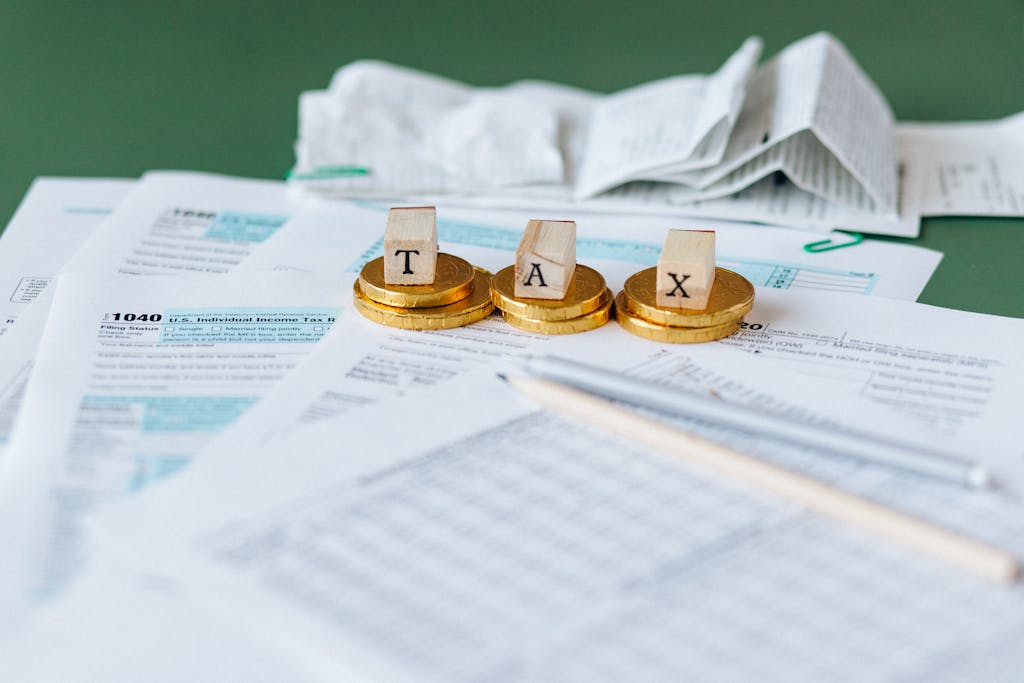
How Do Tax Deductions Work in Australia?
Every year, millions of Australians submit their tax returns hoping to reduce their taxable income through tax deductions. Tax deductions can lower the amount of your assessable income that’s subject to income tax, potentially saving you thousands of dollars each year.
But understanding what expenses you can claim and how to claim them correctly can sometimes be confusing.
This article explains exactly how tax deductions work in Australia. You’ll find out what qualifies as a deduction, how to properly claim a deduction and common pitfalls to avoid. Whether you’re an employee, a sole trader, or a small business owner, understanding deductions can make tax time much easier.
What Is a Tax Deduction?
A tax deduction is an expense you incur that the Australian Taxation Office (ATO) allows you to subtract from your total income. This reduces your taxable income, meaning you pay tax on a lower amount. This doesn’t mean you receive the deducted amount back in full, but it does lower your overall tax liability.
Here’s how the calculation works:
Income – Deductions = Taxable Income
If your income for the financial year is $80,000 and you claim $5,000 in deductions, you’ll only pay tax on $75,000.
The actual amount you save on tax depends on your marginal tax rate. For example, if you are in the 32.5% tax bracket, every $100 of deductions could save you approximately $32.50 in tax.
Tax deductions are often confused with tax offsets or rebates. Offsets directly reduce the tax you owe after it has been calculated, while deductions lower your taxable income before tax is calculated. This article focuses purely on deductions.
How Do Tax Deductions Work in Australia?
Australia uses a progressive tax system, which means the percentage of tax you pay increases as your income goes up. Claiming tax deductions effectively reduces your taxable income, which can potentially drop you into a lower tax bracket or reduce the amount of tax you pay within your current bracket.
Deductions can apply to income from your regular job, self-employment, or investments. However, not every expense you have can be claimed. The ATO sets clear guidelines known as the “golden rules” for deductions:
- You must have personally spent the money, and not been reimbursed by your employer.
- The expense must be directly related to earning your income.
- You must have a record (receipt, invoice, or bank statement) to prove your claim.
Example Scenario:
Consider Ben, a graphic designer earning $70,000 a year. Ben buys a new laptop for $2,500 exclusively for work purposes, pays $1,200 for work-related training, and spends another $500 on professional subscriptions.
Ben’s calculation would look like this:
| Item | Cost |
| Income | $70,000 |
| Laptop (work use) | -$2,500 |
| Work-related training | -$1,200 |
| Professional subscriptions | -$500 |
| Taxable Income | $65,800 |
This means Ben will only pay tax on $65,800 rather than the full $70,000, significantly reducing his tax bill.
Claiming tax deductions involves clearly identifying and calculating these eligible expenses. The better you document your deductions, the easier your tax filing process will be and the lower your chances of encountering issues with the ATO.
What Can I Claim on Tax in Australia?
The table below summarises the most common tax deductions you can claim as an individual or small business owner in Australia, along with brief explanations to guide you:
| Category | Deductible Expenses | Important Notes |
| Vehicle and Travel | – Work-related travel (excluding regular commuting) | Use cents-per-kilometre (85c/km up to 5,000 km) or logbook method |
| Home Office Expenses | – Electricity, phone, internet, stationery, and equipment | Claim 67 cents per hour or actual expense (not both) |
| Uniforms & Protective Clothing | – Uniforms specific to occupation – Protective clothing | Laundry costs deductible (up to $150 without receipts) |
| Self-Education Expenses | – Courses, textbooks, stationery, equipment | Must directly relate to current employment |
| Tools & Equipment | – Items like laptops, phones, machinery | Items under $300 immediately deductible; others depreciated |
| Other Work Expenses | – Union fees, subscriptions, overtime meals (if allowance given) | Must be directly related to your occupation |
| Investment Expenses | – Loan interest, property management fees, maintenance costs | Must relate directly to income-producing assets |
| Donations & Gifts | – Donations to registered charities ($2 or more) | Ensure charity has Deductible Gift Recipient (DGR) status |
| Personal Super Contributions | – Voluntary after-tax contributions to super | Must submit notice of intent to claim to your super fund |
| Income Protection Insurance | – Premiums paid outside of superannuation | Insurance through superannuation fund not claimable |
| Cost of Managing Tax Affairs | – Accountant fees, tax agent fees, ATO interest payments | Professional fees for tax advice and preparation claimable |
| Miscellaneous | – Sun protection (outdoor workers), musical instruments, phone costs | Expenses must be occupation-specific and supported by receipts |
Expenses You Cannot Claim:
| Non-Deductible Expenses | Explanation |
| Daily commuting | Travel between home and regular workplace |
| Personal clothing | General clothes worn to work |
| Employer-reimbursed expenses | Expenses already reimbursed by your employer |
| Personal-use expenses | Any portion of expense not directly related to earning income |
How to Claim Tax Deductions on Your Tax Return
Claiming deductions correctly can significantly impact your tax return. Here’s how you do it effectively:
Filing Your Return
You have two primary ways to lodge your deductions:
- Online using myTax: Simple, free, and quick option via the ATO website, which guides you through the process step by step.
- Using a registered tax agent: Ideal for complex deductions or for expert advice on maximising claims.
The tax return form categorises deductions, such as work-related expenses, charitable donations, and investment costs, making it straightforward to claim what you’re entitled to.
Documentation and Records
Keeping accurate records is essential. Receipts, invoices, and bank statements must substantiate every expense you claim. The ATO advises keeping these records for at least five years from the date you lodge your tax return.
Good record-keeping practices include:
- Digitising receipts immediately after purchase
- Using the ATO’s myDeductions app or digital storage to manage documentation
- Maintaining diaries or logs for home office and car expenses
Substantiation Rules
Understand specific rules around deductions to ensure your claims are valid:
- If your total work-related expenses are under $300, receipts aren’t mandatory, but justification of your claim is still required.
- Laundry expenses up to $150 per year don’t need receipts, but you should explain how you calculated the amount.
- For car expenses, use either the cents-per-kilometre method (no detailed receipts, but keep a travel diary) or the logbook method (requires detailed records for a 12-week period).
Using a Tax Agent vs DIY
A registered tax agent can help you identify all available deductions, ensure compliance, and help manage complex deductions involving multiple income sources or investment properties. This can often result in larger legitimate refunds and less stress at tax time.
Avoiding Common Mistakes
Be cautious about claiming expenses that aren’t eligible or that have been reimbursed. Avoid “double-dipping,” especially with home office expenses or vehicle claims. The ATO actively checks claims using sophisticated data matching, meaning accuracy is vital to avoid penalties or audits.
Lodgment Deadline
Your tax return deadline is generally 31 October each year if you lodge it yourself. However, lodging through a registered tax agent can extend this deadline significantly, giving you more time to ensure accuracy and completeness.
Tips for Maximising Your Tax Deductions
Here are some practical tips to increase the value of your deductions and reduce your taxable income effectively:
Plan and Time Your Purchases
Make necessary work-related purchases, like a new laptop or professional tools, before 30 June each year. Purchases made before this date can be claimed sooner, delivering quicker tax benefits.
Keep Organised Records Year-Round
Regularly update your records to avoid scrambling at tax time. Use apps, spreadsheets, or cloud storage to organise your receipts and other documentation promptly and systematically.
Understand the Rules for Each Deduction
Knowing the specific eligibility criteria for deductions will help you avoid missing out on legitimate claims. Regularly refer to ATO guidelines or seek advice from a tax professional.
Don’t Overlook Smaller Deductions
Small expenses add up quickly, so claiming seemingly minor costs like union memberships, industry subscriptions, or small charitable donations can collectively make a significant difference.
Consider Professional Advice for Complex Situations
If you have investments, rental properties, or self-employment income, deductions can get complicated. Expert advice from a registered tax agent can ensure you’re claiming correctly and maximising your refunds.
Stay Updated
Tax rules and allowable deductions regularly change. Stay informed about new developments or adjustments announced by the ATO. Regular updates can help you take advantage of all available deductions legally.
Key Takeaways
- Tax deductions reduce taxable income, thereby reducing your overall tax liability.
- Common deductions include work-related expenses, home office costs, investment-related expenses, donations, and personal super contributions.
- You must have documentation to substantiate your deduction claims (receipts, invoices, records).
- Non-deductible expenses include daily commuting, general clothing, and any personal-use expenses.
- Good record-keeping and planning purchases strategically before 30 June each year can maximise your deductions.
- Professional tax advice can assist with complex claims and optimise your tax refund.
Frequently Asked Questions (FAQs)
What’s the Difference Between a Tax Deduction and a Tax Offset?
A tax deduction reduces the total income on which your tax is calculated. For example, if your taxable income is $70,000 and you have $5,000 in deductions, you only pay tax on $65,000.
A tax offset directly reduces the tax amount owed. For instance, a $500 tax offset reduces your total tax bill by $500, offering a direct saving.
This article is focused on deductions, which help lower your taxable income before calculating your final tax payable.
Do I Need Receipts for Every Deduction I Claim?
You must keep receipts or proof of expenses to justify deductions. The Australian Taxation Office (ATO) requires these documents to be held for five years from the date you lodge your tax return.
However, certain smaller expenses don’t require receipts:
- Work-related expenses totalling less than $300
- Laundry expenses up to $150 annually
Even in these cases, ensure you can explain how your deduction amounts were calculated if requested.
Can I Claim Car Expenses to Commute to Work?
No, generally commuting between your home and your regular workplace isn’t deductible. However, you can claim car expenses for:
- Travel between different work sites during the day
- Transporting bulky equipment directly related to your job, if no secure storage is available at your workplace
- Travel from home to work if your home is your primary workplace
Detailed records such as logbooks or travel diaries are needed to justify claims.
Can I Claim Home Office Expenses if I Work From Home?
Yes, you can claim home office expenses if you regularly work from home. The ATO allows two main methods:
- Fixed Rate Method (67 cents per hour): Covers electricity, phone, internet, stationery, and general office consumables. Keep a record of your work-from-home hours.
- Actual Cost Method: You calculate the exact portion of your bills and expenses that relates directly to your work. Requires detailed documentation.
Choose the method that offers the greatest benefit and fits your record-keeping ability.
How Long Should I Keep Tax Records?
Keep all tax records, including receipts, invoices, bank statements, and logs, for at least five years from the date you lodge your tax return. Digital records are acceptable and recommended, as paper receipts often fade over time.
Some records related to assets (like investment properties or depreciable equipment) should be kept longer, until five years after you stop claiming depreciation or sell the asset.
Book a Consultation
Feeling uncertain about your tax-deductible expenses and how much tax you have to pay? To ensure you’re maximising your deductions correctly, professional guidance is highly beneficial.
At Box Advisory Services, our team specialises in Australian tax rules and can offer personalised advice tailored to your individual or business circumstances. Our advisors will assist you in identifying every deduction you are eligible for, ensuring you pay no more tax than necessary.
Book a consultation today to take the stress out of tax time and gain confidence that your return is accurate and compliant.
Disclaimer:
Please note that every effort has been made to ensure that the information provided in this guide is accurate. You should note, however, that the information is intended as a guide only, providing an overview of general information available to contractors and small businesses. This guide is not intended to be an exhaustive source of information and should not be seen to constitute legal or tax advice. You should, where necessary, seek your own advice for any legal or tax issues raised in your business affairs.



